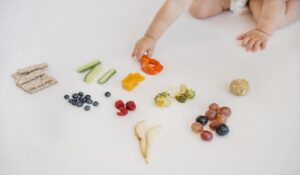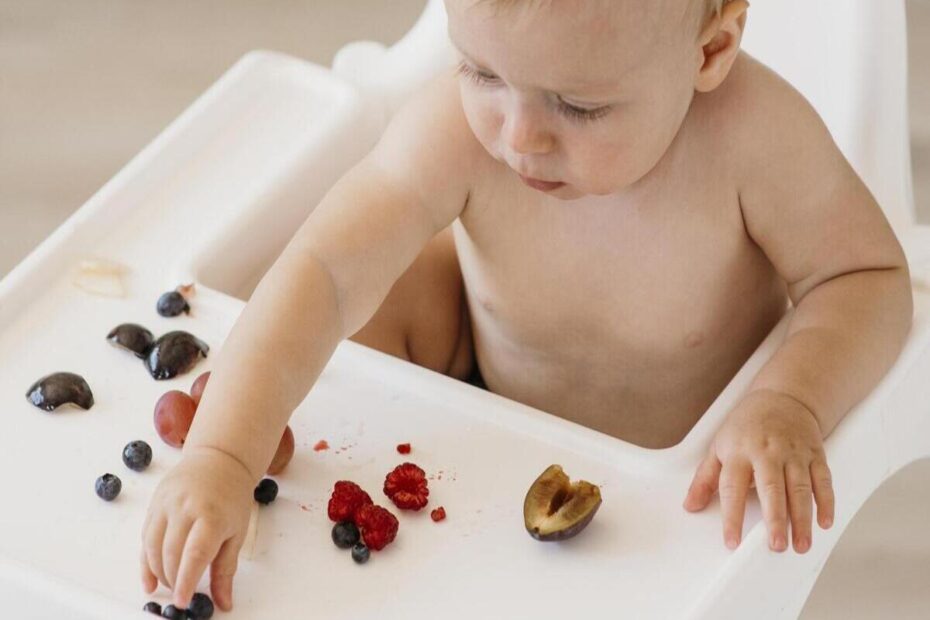Are you prepared to embark on the journey of introducing your precious little one to the world of solid foods? Transitioning from breast milk or formula to solids is a significant milestone in your baby’s development. It’s a thrilling adventure filled with new flavors, textures, and discoveries waiting to be explored, including finger foods for baby. But with so many options out there, where do you begin?
The key lies in selecting the right finger foods, as they can set the stage for a lifetime of healthy eating habits. Let’s delve into some essential tips and top finger foods for babies that will not only make mealtime enjoyable but also ensure that your baby receives the nutrition they need to thrive.
Baby’s First Finger Foods: A Gateway to Healthy Eating
As your baby continues to grow and becomes increasingly curious about the world around them, it’s only natural to want to introduce them to new experiences, including different types of foods. This is where finger foods come into play. These are small, bite-sized pieces of food that are specially prepared to be easy for little hands to pick up and explore.
Imagine your baby’s chubby little fingers reaching out to grasp a soft piece of banana or a tiny cube of cheese. With finger foods, they can explore the textures, colors, and flavors at their own pace, all while honing their fine motor skills. This process of picking up, examining, and eventually tasting different foods is not just a sensory experience but also an important part of their development.
Moreover, offering finger foods empowers your baby to feed themselves, fostering a sense of independence and self-reliance from an early age. As they learn to pick up and eat these small pieces of food on their own, they’re also developing essential skills that will serve them well as they continue to grow and navigate the world around them.
So, introducing finger foods isn’t just about providing nourishment; it’s also about nurturing your baby’s curiosity, independence, and self-confidence. It’s a wonderful way to encourage exploration and instill healthy eating habits that will benefit them for years to come.
Why Choose Finger Foods for Babies?
Finger foods for babies offer several benefits for your baby’s development. Here are some of the key advantages:
- Promotes Independence
Introducing finger foods empowers your baby to actively participate in their eating journey. By offering foods they can pick up with their fingers, they gain the opportunity to take charge of their mealtime, fostering a sense of independence and autonomy.
As they practice grasping, bringing food to their mouth, and experiencing various textures and tastes independently, they not only refine their fine motor skills but also develop a deeper understanding and appreciation for different foods, setting the stage for a lifetime of healthy eating habits.
- Develops Fine Motor Skills
Introducing finger foods to your baby isn’t just about nourishing their growing bodies; it’s also a crucial part of their developmental journey. When they handle these foods, they’re not only exploring different tastes and textures but also honing essential fine motor skills.
By grasping and manipulating finger foods, like picking up small pieces of fruit or cereal, babies refine their hand-eye coordination and master the pincer grasp, where they use their thumb and forefinger to pick up tiny objects.
These skills lay the foundation for self-feeding and other tasks as they grow, such as holding a spoon, writing, or tying shoelaces. So, every little bit of finger food is a step toward independence and mastery of essential life skills.
- Encourages Self-Feeding
When you offer finger foods to your baby, you’re giving them the chance to take charge of their own eating experience. This act of self-feeding not only encourages independence but also helps them develop a sense of autonomy from an early age. This early exposure to self-feeding sets the stage for healthy eating habits and mealtime routines in the future.
By allowing your baby to explore and choose what they want to eat, you’re empowering them to make their own food choices, which can lead to a positive relationship with food as they grow older. This sense of control over their meals can instill confidence and a willingness to try new foods, ultimately contributing to a balanced and nutritious diet in adulthood.
- Explores Different Textures
Introducing finger foods with a range of textures exposes your baby to diverse sensory experiences. From the softness of cooked vegetables to the crunchiness of whole-grain cereals, each texture offers a new sensation for your baby to explore. By allowing them to touch, taste, and manipulate these different textures, you’re helping them become more familiar and comfortable with a variety of foods.
This early exposure can play a crucial role in preventing picky eating habits later on, as your baby learns to accept and enjoy a wide range of textures and flavors from the start.
- Enhances Oral Motor Skills
When your baby chews and swallows finger foods, it’s not just about nourishment—it’s also a workout for their mouth muscles. These actions involve coordination between the tongue, lips, and jaw, helping to strengthen their oral motor skills. These skills aren’t just important for eating; they’re crucial for speech and language development too.
So, every time your little one munches on a piece of finger food, they’re not only satisfying their hunger but also laying the groundwork for clear communication in the future.
- Promotes Nutritious Eating
Offering nutrient-rich finger foods for baby, such as fruits, vegetables, whole grains, and lean proteins, ensures that your baby receives essential vitamins, minerals, and other nutrients necessary for growth and development. Fruits and vegetables provide a wide range of vitamins and minerals, including vitamin C, potassium, and fiber, which support immune function and digestion.
Whole grains offer complex carbohydrates for sustained energy and B vitamins for metabolism, while lean proteins like chicken and tofu supply essential amino acids for muscle and tissue growth. By introducing these nutrient-dense foods early on, you’re laying a strong foundation for your baby’s overall health and well-being.
Overall, incorporating finger foods into your baby’s diet can provide valuable opportunities for learning, exploration, and healthy eating habits that will benefit them throughout their lives.

Top Finger Foods for Babies
Now that you understand the importance of finger foods, let’s explore some nutritious options to include in your baby’s diet:
Soft Fruits and Vegetables
Start your baby’s journey into finger foods with soft, ripe fruits such as bananas, avocados, and cooked sweet potatoes. These options are not only gentle on their gums but also rich in essential vitamins and minerals crucial for their growth and development.
Soft fruits like bananas and avocados can be easily mashed with their gums, while cooked sweet potatoes offer a soft texture that is easy for them to handle.
By introducing these nutrient-packed options as baby’s first finger foods, you’re providing your baby with a delicious and nutritious start to their culinary adventures.
Cooked Pasta or Rice
Cooked pasta shapes such as spirals or small shells are excellent options for introducing finger foods for baby. Their soft texture and easy-to-grasp shapes make them perfect for tiny fingers to pick up and explore.
Additionally, cutting cooked pasta or rice into small, manageable pieces provides your baby with the opportunity to practice their fine motor skills while experiencing different textures.
Opting for whole-grain varieties not only adds fiber to their diet but also introduces them to nutritious options that contribute to their overall health and development. These choices not only nourish your baby but also encourage their independence and curiosity during mealtime.
Cheese Cubes
Cutting cheese into small cubes or strips provides a convenient and delicious finger food option for your baby while also offering important nutrients like calcium. Opting for mild, pasteurized cheese reduces the risk of choking and ensures that your baby can safely enjoy this nutritious snack.
Calcium is essential for bone development and overall growth, making cheese an excellent addition to your baby’s diet.
Additionally, the texture and flavor of cheese can help stimulate your baby’s taste buds and encourage them to explore new foods.
Toast or Bread
Introducing small pieces of lightly toasted bread or breadsticks to your baby can be a great way to encourage self-feeding and explore new textures. Toasting the bread lightly helps soften it, making it easier for your baby to chew and swallow.
Additionally, you can enhance the flavor and nutritional value by spreading a thin layer of nut butter or mashed avocado on the bread. Nut butter provides healthy fats and protein, while avocado is rich in vitamins and minerals like potassium and folate. These additions not only introduce new flavors but also boost the nutrient content of the snack, supporting your baby’s growth and development.
Just be sure to spread the toppings thinly and watch for any signs of allergies or choking hazards as your little one enjoys this tasty and nutritious finger food option.
Cooked Meat or Fish
Cooked and finely shredded meat or fish are excellent sources of protein and iron for your growing baby. These nutrients are crucial for their overall development, including muscle growth, brain function, and healthy blood production. Ensuring that the meat or fish is thoroughly cooked is important to eliminate any potential bacteria or parasites that could be harmful to your baby’s health.
Additionally, cutting the meat or fish into small, manageable pieces reduces the risk of choking and makes it easier for your baby to chew and swallow. By including these protein-rich foods in your baby’s diet, you can help support their growth and ensure they are getting the essential nutrients they need for optimal health.
Steamed Vegetables
Steam soft vegetables like carrots, broccoli, and zucchini until they are tender enough for your baby to easily mash between their gums or chew with their budding teeth. Once cooked, cut them into small, finger-friendly pieces that your little one can grasp and explore at their own pace.
These colorful veggies are not only visually appealing but also packed with essential vitamins and minerals crucial for your baby’s growth and development. From supporting healthy eyesight with beta-carotene in carrots to providing bone-strengthening calcium in broccoli, these nutrient-rich options lay a strong foundation for your baby’s overall health and well-being.
Yogurt Drops
Freezing small dollops of yogurt on a baking sheet offers a delightful and refreshing treat for your baby. These yogurt drops not only provide a cool and soothing sensation, which can be especially comforting for teething babies, but they also pack a nutritional punch.
Rich in calcium, yogurt helps support healthy bone development, while the probiotics it contains promote good digestive health. Offering yogurt drops as finger foods introduces your baby to new textures and flavors while ensuring they receive essential nutrients for their growth and well-being.
Building Healthy Habits from the Start
Introducing the best finger foods for baby diets is an exciting and essential step in their journey towards healthy eating habits. By offering a variety of nutritious options from an early age, you’re laying the foundation for a lifetime of good food choices.
It’s important to remember to supervise your baby during mealtime and offer foods that are age-appropriate and easy to chew. This ensures their safety and helps them develop positive associations with mealtime.
With patience, persistence, and plenty of smiles, you can make mealtime a fun and enjoyable experience for both you and your little one. Encourage exploration and independence while providing support and guidance along the way.
Ready to start your baby’s culinary adventure? Explore Honest Dad’s collection of nutritious finger foods for baby and get ready to watch your little one discover the joys of independent eating. Every bite is a step towards a healthier, happier future!

